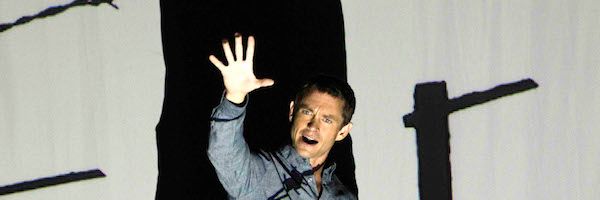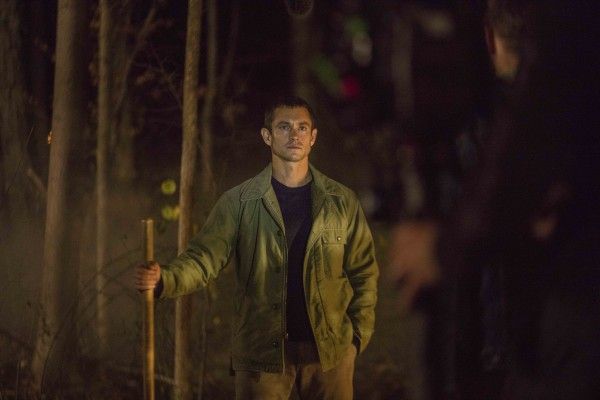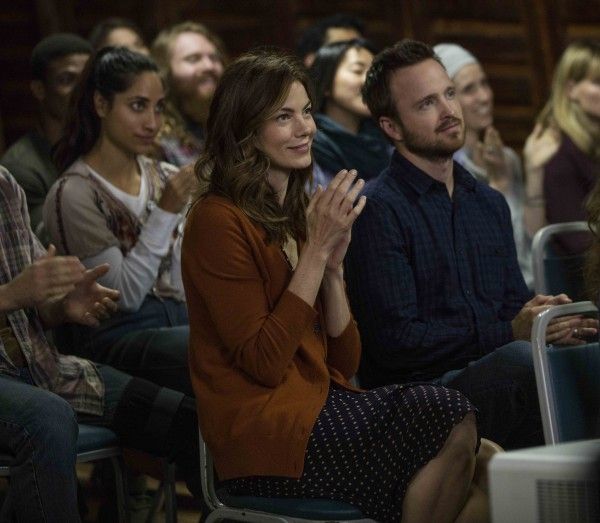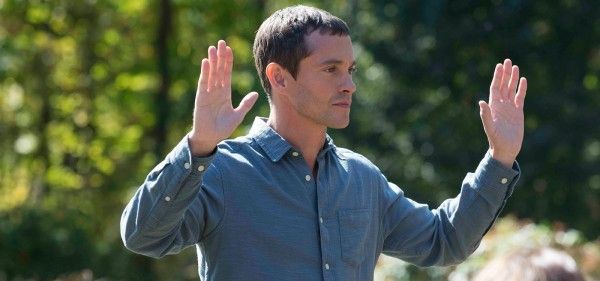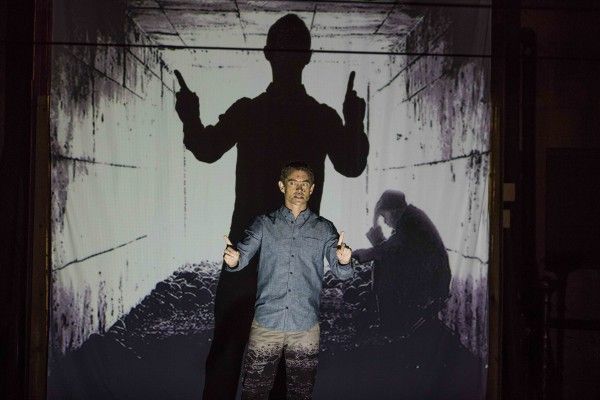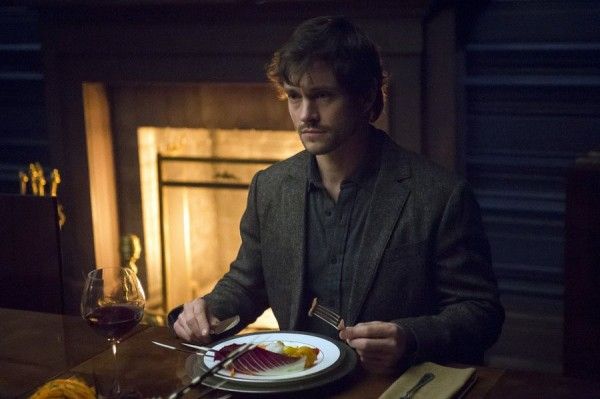The Hulu original series The Path follows a family at the center of a controversial religious movement, known as Meyerism, as they struggle with relationships, faith and power. As Eddie (Aaron Paul) questions whether all of the answers can be found within the religion that his wife Sarah (Michelle Monaghan) is so dedicated to, she finds herself pulled deeper and deeper into Cal’s (Hugh Dancy) world and his views on the way that they should be led.
During this exclusive interview with Collider, actor Hugh Dancy talked about what he most enjoys about being a part of The Path, the appeal of this character, the rapid growth of Hulu as a quality streaming service, what kind of leader Cal is to him, and the way these types of movements work with their followers. He also talked about how he’d love to return to Hannibal, at some point, and why taking some time away from it might be a good thing.
Collider: What are you most enjoying about being a part of this show and playing this character?
HUGH DANCY: One of the things I liked about the show, as a whole, and I’m sure this is true for Aaron [Paul] and Michelle [Monaghan], is that you had to spend a lot of time with the lines to get below the first level. So often, particularly Cal is speaking from a place of doctrine, but it’s also something that he really, really truly believes, and then that’s covering up something else. You have to do justice to all of those things, rather than just spouting a line. That’s good fun for an actor. Cal is constantly trying to balance so many aspects of his own personality without realizing it.
Coming off of a show as excellent as Hannibal, were you hesitant about doing another TV show?
DANCY: Yeah, I was. The fact that this is so different was definitely a part of the appeal, although that only goes so far. If you’re just looking for an extreme alternative, that’s not going to work out so well. But yeah, I was hesitant and I probably scrutinized it more carefully, as a result, looking for the cracks and the flaws. And then, the more I dug into it and thought about it, and particularly after I had spoken to Jessica Goldberg, who is the showrunner, and (executive producer) Jason Katims, I realized that with anything interesting, there’s a really good version of it and there’s a bad version of it. Anything that exists in an area of ambiguity that’s going to be fun to do, there’s a bad version that doesn’t achieve the subtlety that you’re hoping for. In this case, if you just tried to go straight for the charisma or the manipulativeness with Cal, that would be quite boring. I felt like they were coming at the whole thing from the point of view of, what are these beliefs, and then taking those beliefs seriously. I thought, “These people clearly want to make the best version of this show.” After that, I signed on.
It’s interesting how the show really puts the focus on the characters, and the movement itself is almost secondary to them.
DANCY: Everything they do is within the context of this movement, and I think it’s right that, in a way, it becomes invisible. If you are somebody living in that way, and I think it’s true for all of us, we don’t even notice our core beliefs. We hardly even know that we hold them. The opinions that we’re trying out, we’re much more aware of, and we voice them and see what happens. But the things that, deep down, identify who we are, we’ve lost sight of. There’s nothing wrong with that, that’s just the case. For these people, that’s the entire bubble that they’re living inside. And because that’s a given, what they’re thinking about is, what am I going to have for lunch, or how’s the marriage going.
Within TV projects, there are so many different canvases to pain on, with broadcast, cable and streaming services. Were you familiar with streaming services, prior to doing this show? Is that something you use yourself?
DANCY: Yeah, sure. I’ve watched shows on Netflix and Amazon, for example. When this came around for me, last June, I was like, “Oh, okay, Hulu.” Just between then and now, the speed with which they’re positioning themselves, with such quality, has been very impressive to me. But when I signed on to this show, it wasn’t because of that. I didn’t realize that was happening. I was like, “I don’t know what the platform will be like, but I love the show,” so I had to go with my feelings, in that regard. Now, I’m delighted to realize that this is a big calling card for Hulu, so they’re very invested in it and love the show. That’s all really nice. But the truth is, in the making of it, the only thing that differed, for me, was that you have this very unquestioning support from the people that are paying the bills. That filters down to the actors because it primarily affects the writers and the scripts. The message they were getting from Hulu was, “Go where you want to go and explore what you want to explore,” and you sense that when you get the script. We had freedom.
Because Cal is a guy who has so many layers, and he’s holding so much back from so many people, how do you view him? What kind of a leader is he to you?
DANCY: He is trying to hold it together and he is coming from a place of a very dark background, but all of that stuff is stuff that he’s shared and continues to share with his community. He’s not just putting a happy face on it. I think that is really interesting. Honesty can be used as a weapon. If you insist on honesty, under specific circumstances, particularly if it’s 95% honesty, it can be very powerful. He’s fully invested in the idea of transparency, he’s just not quite there. He is also very active. He’s not someone who’s going to sit around and agonize over what he’s doing. He’s just going to do it, and he’s going to do it strongly with a strong play. That makes him a leader. He is invested in the idea of how to exercise influence over people. It’s not just that, by default, he’s charismatic. He’s learning and really thinking hard about how to do this. He wasn’t planning on being a leader. He was going to be a follower to Steve, who was going to live forever.
He gets stick in this situation he didn’t expect, but then he uses it to his advantage.
DANCY: I don’t know if that’s self-preservation, but that part of him that grows alongside his desire to save the movement is a much more ambitious, domineering thing. The two go hand-in-hand.
As you were getting the scripts and learning more about this fictional movement, did you find yourself identifying with what was being presented?
DANCY: Like a lot of people, I have mixed feelings about that. I don’t think of myself as a joiner, although I think a lot of us have the capacity to fall head-long into the craziest beliefs, and none of us are immune to that. I’m not saying it will happen to all of us, but any of us have something inside of us that’s a place of vulnerability. If the right person at the right moment reaches out and touches you, you can go so far down the line before you even know where you are. I really believe that. We also don’t know what our capacity for doing awful things is, or turning a blind eye to terrible things. We’d like to think we’d be the hero, but most of us would not be the hero. But I do understand the desire to have a community, even if it’s just in your close friends. It doesn’t have to be a structure, but people who you can turn to, with all your flaws, and say, “I fucked up. Don’t judge me.”
It’s interesting to see a movement like this push that they’re like a family, but then if your family doesn’t agree with their beliefs, you’re supposed to cut your real family off.
DANCY: The more maligned versions of this kind of movement put a lot of effort into undoing family bonds very quickly, and they try to convince you that your family doesn’t have your best interests at heart. There isn’t a human alive that hasn’t, at some point, had mixed feelings about their parents. If you tap a person at the right point, you can exploit that. And I don’t think that’s particularly what’s going on with Meyerism. It’s a more general sense that the people outside are going to bring about the destruction of the entire world. If I really believed that my family were a part of bringing about the destruction of the entire world, I’d like to think I’d still stick with them, but you never know.
With as much as everyone involved loved being a part of Hannibal, if it was something you could find a way to revisit, at some point, would you?
DANCY: Oh, totally. Bryan [Fuller] has got plenty on his plate and everybody is busy, which is fantastic, but I think we’re in a place where we can say, “Okay, let’s see what happens in four years.” If we’re able to revisit it, maybe it would be different. I don’t know what shape it would take. I’ve said many times, and it’s completely true, that I would love that. If we were able to come back, maybe taking a few years away for it to reform itself might be the best thing that could happen for it. I certainly think it’s warranted, just by where we got to in the story. Sure, you could start a fourth season, or whatever it would be, with a big splash and see what happens when they hit the water, but I think it would be more interesting to find them a few years down the line.
The Path is available at Hulu on Wednesdays.

